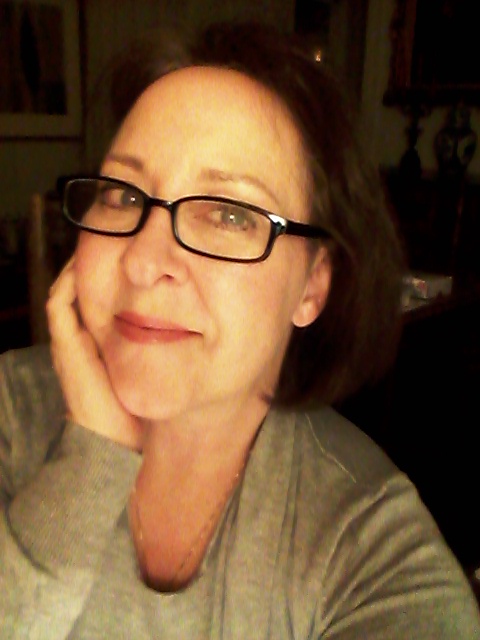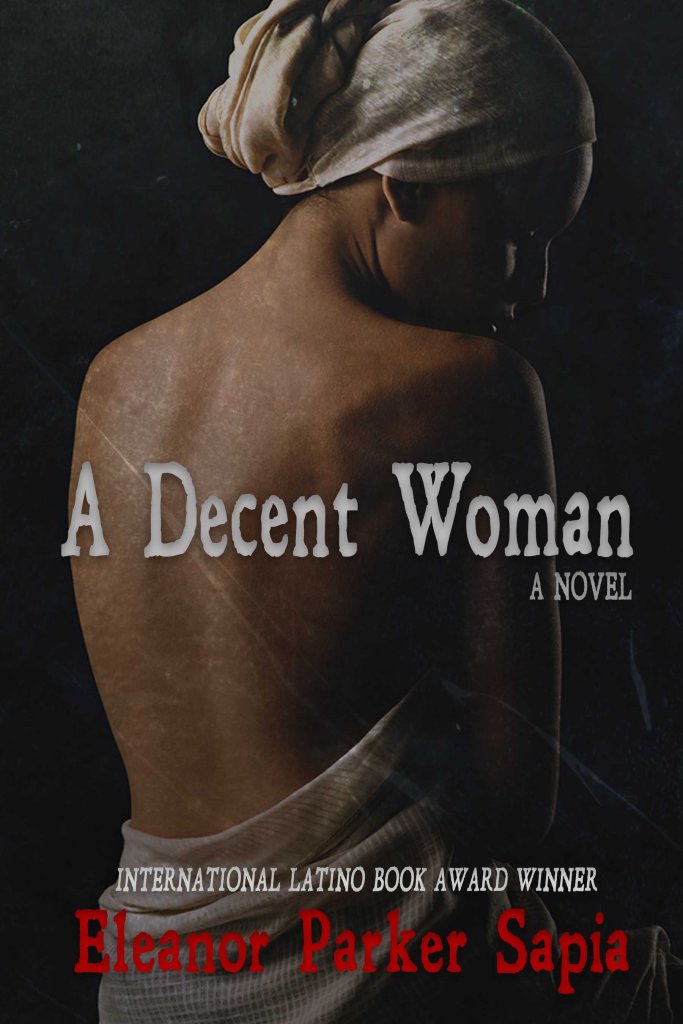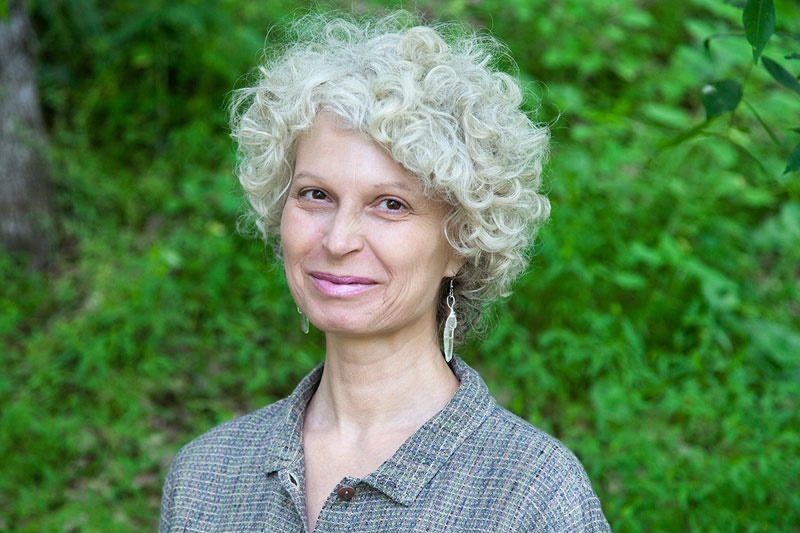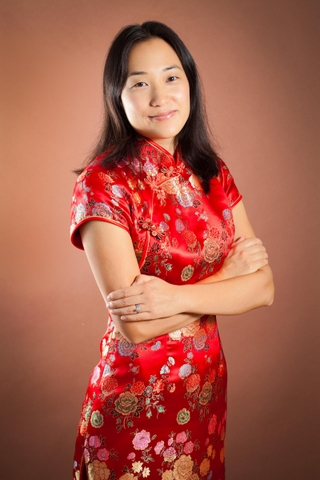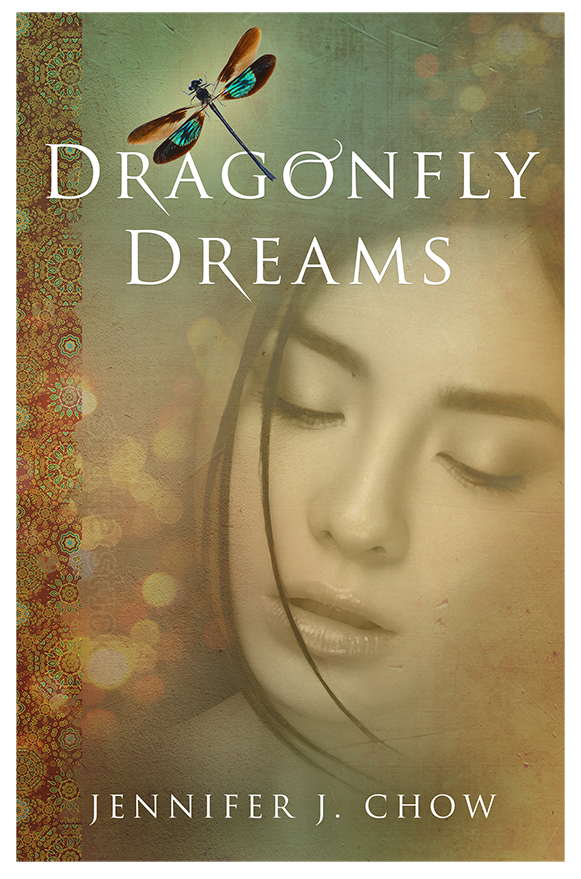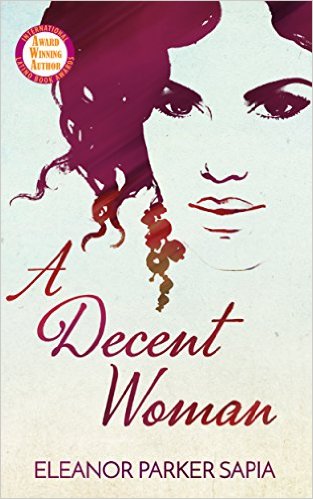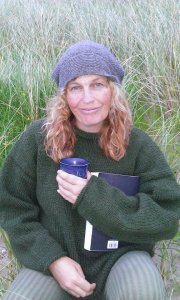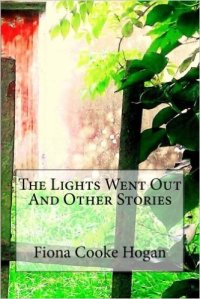Welcome to our first author interview of 2017! Here at The Writing Life blog, I have the great pleasure of chatting with authors across genres every Tuesday. Today, I’m happy to chat with talented artist and award-winning author, Caroline Allen.
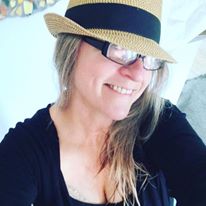
Caroline Allen is the author of EARTH and AIR, part of the 5-book Elemental Journey Series. Both novels were published in 2015 by Booktrope Editions of Seattle. Each won Independent Publisher awards soon after publication, a gold medal for regional fiction for EARTH, and a silver medal for visionary fiction for AIR. Prior to becoming a fiction writer, she worked as a journalist all over the world, as a reporter and editor in Tokyo, London and Seattle, and as a travel writer throughout SE Asia. She now lives in rural Oregon and is a book coach and a visual artist.
Welcome, Caroline!
What are your book’s genres?
Literary, visionary fiction.
Please describe what your books are about.
I’m writing a series of five books, The Elemental Journey Series, which includes EARTH, AIR, FIRE, WATER, and ETHER.
EARTH and AIR were published by Seattle’s Booktrope Editions in 2015. I’m currently at work on the third novel. All five books follow one protagonist on a hero’s journey around the globe as she finds herself in a world rocked by climate change and growing chaos. What does a person’s journey look like in such an unstable world? Is there a greater spiritual call to be answered by each person in a world on the edge?
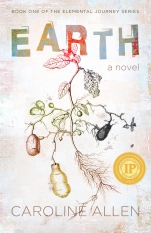
EARTH looks at our protagonist as she is rooted in place, in the rural farmland of her ancestors. Pearl Swinton, the protagonist, has mystical visions. She wants nothing to do with these visions, her family and teachers think she’s crazy. She can find nowhere where she “fits.” When she hears her aunt in another town has the same “curse”, she goes on a bicycle journey to find her. In the end, she learns she must uproot from this rural bedrock of tradition and forge a new path for herself.
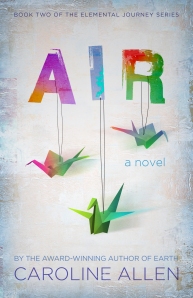
In AIR, Pearl lands in Tokyo, where she hopes to float above the culture and find perspective. She meets a Japanese missionary who makes himself homeless, in his despair over his brother’s death in a culture that overworks its people. As he lives beneath a bridge folding origami cranes, he tells Pearl he is now homeless, just as she has made herself in leaving her rural American hometown. What are the uses of disconnection? He asks her: Where truly is home? He urges her to study her visions to find her purpose and help the world.
You ask great life questions. How did you come up with the titles?
I was a short story writer, living in Washington state, more than a decade ago now. I was sleeping in Seattle when I awoke from a dream and sat up, and I was “given” the message that my short stories would fit together into a novel, and there would be a series, EARTH (connection to our place of birth), AIR (leaving our traditions and floating above the culture), FIRE (the burning of the ego in London), WATER (personal healing in the Pacific Northwest), and ETHER (being of spiritual service to others).
I was “given” the general story for each book. The task after the dream, of course, is developing the characters, writing all of the plot twists, revising and editing and getting the books to market. It’s a lifetime task.
Fascinating. What inspired you to write this series?
I was an international journalist for a decade, working in newsrooms in Tokyo and London. I was at the London dailies when I had a huge spiritual opening. I didn’t understand what was happening, but I was able to read everyone’s mind, no, more than that, I could see the bigger truths affecting them. It hit me all at once, and was extremely overwhelming. I moved back to the States as part of the process of figuring out what was going on with me. When I finally integrated this side of myself by doing metaphysical healing work in Seattle for years, I was inspired to include “visions” in the novels. What if there was a character who all of her life had spiritual visions? How would everyone react? What purpose would her visions ultimately fulfill?
My path in understanding my visionary side inspired me to write all five books.
I look forward to reading your books, Caroline! What is your favorite part of writing?
When I created Usui, the Japanese missionary, in AIR, I fully and completely fictionalized him. My books are semi-autobiographical in that sometimes a scene or a place or a character is based on either real life, or an amalgamation of different lives. But Usui was totally fictionalized. And I fell in love with him. I’m still in love with him. He is like the greatest love of my life. I dream of him, and talk to him and feel his presence. He’s depressive and weak and shy, but also so spiritually evolved. It’s just this love. I cannot explain it any other way.
His spirit has come back in FIRE, the novel I’m writing now, and he shows up and speaks every once in a while to my protagonist. My favorite part of writing is this falling in love. It’s as real as any love I’ve ever known.
What’s really exciting is that apparently I’m not the only one who fell in love with him. A Massachusetts artist fell for Usui too, did a painting of a scene in the novel where Usui is folding origami cranes beneath a foot bridge as a homeless person. The painting was accepted into a major juried show called Alienation in the fall of 2016.
The character Usui is intriguing as I practice Usui Reiki. The strong connection most authors have to their character(s) is quite fascinating. It happens to me, as well.
Does your main character resemble you? If so, in what ways?
Pearl Elizabeth Swinton is a semi-autobiographical version of me. Like me, she grew up on a subsistence farm in Missouri, flew to Tokyo to live and work, traveled through SE Asia, lived in London and ended up in the Pacific Northwest. Unlike me, she has had visions since she hit puberty, and this fact in itself changed how closely the story could follow my life. Pearl is much more excitable than I ever was, much more dramatic, and much less intellectual.
As she travels the world, she meets many characters who do not exist in real life, people I never met.
I’m a book coach, as well, helping people all over the world write novels and memoir. Just this morning, I was speaking to a fiction client about how important it is to disconnect from thinking the protagonist is you. You need the freedom to truly create a work of art. I have been able to see Pearl as separate from me, even though sometimes our paths run side-by-side.
What do you find is the most challenging aspect of writing, Caroline?
Writing envelopes me. It swallows me. It takes me over like a whirlwind romance. I have to figure out a way to go into that phase and to come out of it, or, as has happened in the past, I look up and it’s the first of the month and I didn’t make enough money to pay the bills.
There were bigger challenges in the beginning of my fiction-writing life. When I gave up journalism, I couldn’t seem to get into the next phase of creative writing. I wasn’t writing. Anything. I was so shut down and didn’t know why. I came to a dangerous edge in my life. In therapy, a counselor told me, “You need to write every day. Every single day.”
I burst out sobbing. “I can’t. I can’t.” I just kept repeating those two words. “I can’t. I can’t. I can’t. I can’t. I can’t,” wailing into my hands.
“Why?” she asked again and again.
“The monsters will come out. If I open that door, the monsters will get loose.”
She sat pondering, while I rocked on the sofa.
She didn’t even ask me to explain the monsters. I would’ve had no words for what I meant. Instead, she said: “OK, you like to build things, right? Here’s the plan. Go home and build a cage. Put it beneath your writing desk. Keep the monsters in the cage. You’ll need them for writing, so open the cage every morning to start your writing session, let them out, write, then put them back in and close the cage door. Can you do that?”
I looked up, sniffed, and nodded. For some reason, I loved the idea.
I built the cage. It sat under my desk for 13 years.
I understand the need of a visual and even a literal cage when dealing with monsters after a creative period. Artists and writers need their dark sides, as they are part of the whole.
What was the last book you read? What did you think of it?
Incarnations by Susan Barker. Loved it. Written by a British author, well-researched and beautifully written. It deals with the past lives of a Chinese taxi driver. I dig past lives and think the whole subject is rich fodder for fiction.
Caroline, who are some of your favorite authors?
Mostly my favorite writers are poets. Mary Oliver and Adrienne Rich top the list. Women who live their lives with integrity, outside the mainstream, who speak with poetry and love about their lives.
What authors or person(s) have influenced you as a writer and why?
Kazuo Ishiguro’s A Pale View of Hills and The Unconsoled were profoundly strong influences on me. He plays with time in both books, where forward is backward and now is then and people exist and do not exist, and he writes about these subjects within a well-told plotted story. This appeals deeply to my metaphysical side. I do not think life is linear, and an understanding of the nonlinear life can help expand our excitement of it. Authors who go to that place seem expansive and exciting to me.
Camus and Dostoyevski are two other influences. Any author who sees the dark side and absurdity of what it called “normal” society appeals to me. To me what we call normal is absurdist at best.
Do you have a favorite place to write?
My yurt! When I finished AIR, I gave myself the gift of a yurt in the woods. The original yurts were and still are used by nomadic tribes in Mongolia. A modernized versions of these are becoming popular on the U.S. West Coast. When I moved to Oregon, I camped up and down the coast to get to know the state, and the state parks rent yurts as cabins. I fell in love with the round, domed structures.
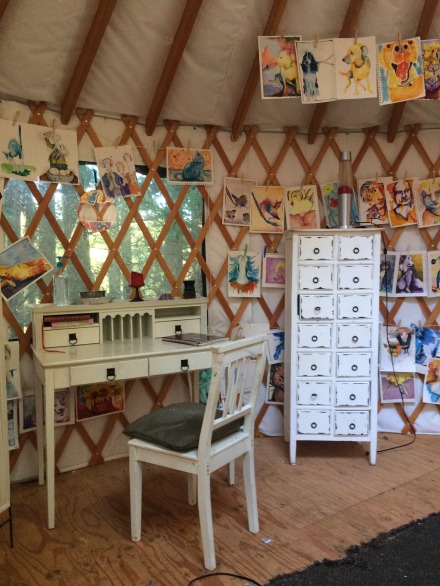
I purchased a kit from Pacific Yurts. Don’t let the word “kit” fool you. It was an intense full-on construction scenario and my friends and I were utterly exhausted after building it in a clearing in the woods.
Months after it was constructed, I found a desk, chair, and dresser down a rural road, at the end of a gravel driveway, placed there for free by the owners. It was the kind of furniture I would’ve loved as a little girl. Now, I had my writing desk. There is no internet connectivity or consistent electricity, so it’s just me, my laptop with its battery, and some candles. Next year, I will be able to afford a wood stove. The view is of forest. A family of deer like to hang out around it. There’s even a bear. Being that close to the wild engages my inner wild child writer.
I do love the idea of a yurt in nature! Tell us something personal about you people may be surprised to know?
I’m also a visual artist. That’s not the surprise. I just finished a project called Outside the Lines, one painting a day for one year. For 366 days — it was a leap year — I painted a painting every single day. That’s not the surprise either. I painted one while in the departure lounge waiting for a late United flight, my carryon as an easel, I painted one the day I had surgery for an accident that severed my foot from my leg (the morphine made the painting really really wild), and I painted one during a birthday party for me in Seattle.
Anyone who follows me on social media knows about these paintings. I’ve strung them on clothes line with pins around the inner walls of my yurt, like prayer flags.
This is the surprise and it’s happened several times: I’ll walk into the yurt and see all of the paintings, hundreds of expressions of my soul, and become so emotional. I’ll wish I could paint like that. Oh, if I could just paint like that I’d be such a fulfilled person. I’d feel so weepy. Yes, I look at my own paintings and wish I could paint like I already do paint. That reaction is a surprise even to me. I still don’t get my reaction. A healer friend told me sometimes it takes the emotional body time to catch up with the physical body. Perhaps that is it.
We are constantly peeling our emotional onion while writing and painting, aren’t we?
Did the writing process uncover surprises or learning experiences for you? What about the publishing process?
As an author and a book coach, the biggest thing that always, ALWAYS, surprises me is how far we women still have to go in speaking our soul truth. How far we have to go as writers in working through the blocks to speaking our truth, and how far the publishing industry has to go in accepting us. It surprises me again and again that people are not used to women truly speaking the depths of their truth.
If my protagonist, or me as a person, speaks in terms of her/my relationships (to the opposite sex, or to children, or to any sort of caregiving role), we are much more accepted and acceptable.
Speaking pure truth through fiction or memoir is still more rare than it should be. This affects the writing process and it affects publication. Finding a publisher who’ll take a chance on women speaking deep soul truth is better than it was, but it’s still too difficult!
I wholeheartedly agree with you; still too difficult. What do you hope readers will gain from your books?
All five books explore a paradigm shift from linear thought to a more spiritual holistic mindset, through the story of one character. The books go from sticking to the past of our ancestors to trying an entirely new way of living through a shift in our perceptions. My deepest hope is that by explaining the process, in five books that will take decades to complete, the details of the path will help others on a similar journey. I believe we all need to make this paradigm shift, but that it’s so radical that no one person or book is going to create it. I am part of a greater path of bringing this information into this time period in the world.

Looking back, what did you do right that helped you write and market this book?
Tenacity. I have nothing else to add. Simple hard work, day after day, month after month, year after year. You’ll be exhausted.
What didn’t work as well as you’d hoped?
Everything worked, even the things that didn’t because they were part of the learning process for “being” a fully fledged writer. I wouldn’t change any of it.
I landed a big New York agent with EARTH. I really connected with him. He loved my novel. We shopped the book around to all the major houses, and we got great feedback and some serious nibbles, but nobody would bite. It was a two-year process that failed. But I would not say it didn’t work. What I learned was unbelievably helpful. It helped me as a writer and as a book coach. I wouldn’t change that “failure” for the world.
Do you have any advice or tips for writers looking to get published?
Tenacity. Tenacity. Tenacity. It may take a decade longer than you thought. My path took 15 years longer than I thought it would. You may well be writing about subjects before your time! Maybe the world hasn’t caught up with you. But, your time will come, but you’ll miss it if you give up.
Great advice, Caroline. I love the idea of writing about subjects before our time!
Website and social media links?
www.carolineallen.com
www.artofstorytellingonline.com
www.artofstorytelling.wordpress.com
www.facebook.com/carolineallenartist
www.twitter.com/artofstory
http://www.instagram.com/carolineallenartist
Where can we find your book?
Amazon
EARTH
https://www.amazon.com/Earth-Elemental-Journey-Book-1-ebook/dp/B01GIBQIFA/ref=sr_1_1?s=books&ie=UTF8&qid=1483405361&sr=1-1&keywords=earth+by+caroline+allen
AIR
https://www.amazon.com/Air-novel-Elemental-Journey-2/dp/1513703943/ref=sr_1_1?s=books&ie=UTF8&qid=1483405375&sr=1-1&keywords=air+by+caroline+allen
Barnes and Noble
EARTH
http://www.barnesandnoble.com/w/earth-carol-allen/1000420387?ean=9781620156513
AIR
http://www.barnesandnoble.com/w/air-david-allen/1000420194?ean=2940153195681
IBooks
EARTH
https://itunes.apple.com/us/book/earth/id1119725900?mt=11
AIR
https://itunes.apple.com/us/book/air/id1119726394?mt=11
What’s next for you?
I’m nearly finished with my third novel, FIRE, and I just landed a literary agent. In FIRE, Pearl travels throughout SE Asia and lives in London, where she meets people who lead her more and more closely to her purpose. Before she can find her purpose, though, she has to heal her lost self.
The literary agent and I will shop the book around to find a publisher this year.
Fantastic, Caroline. It was great having the chance to know more about you and your series. All the very best with your writing and painting in 2017!
About Eleanor:
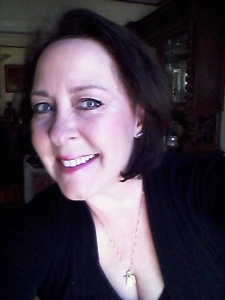
Puerto Rican-born Eleanor Parker Sapia is the author of the award-winning historical novel, A Decent Woman, published by Scarlet River Press. Her debut novel, set in turn of the century Ponce, Puerto Rico, garnered an Honorable Mention for Best Historical Fiction, English at the 2016 International Latino Book Awards with Latino Literacy Now, and was selected as a Book of the Month by Las Comadres and Friends National Latino Book Club in 2015. A writer, artist, and photographer, Eleanor is never without a pen and a notebook, and her passport and camera are always ready. Her awesome adult children are out in the world doing amazing things. Eleanor currently lives in Berkeley County, West Virginia, where she is working on her second novel, The Laments of Sister Maria Inmaculada, set in 1920 Puerto Rico.
Eleanor’s book: http://amzn.to/1X0qFvK
Please visit Eleanor at her website:
www.eleanorparkersapia.com
